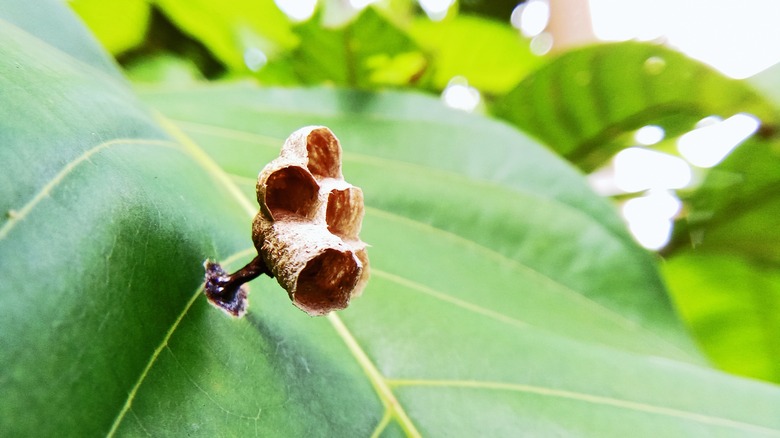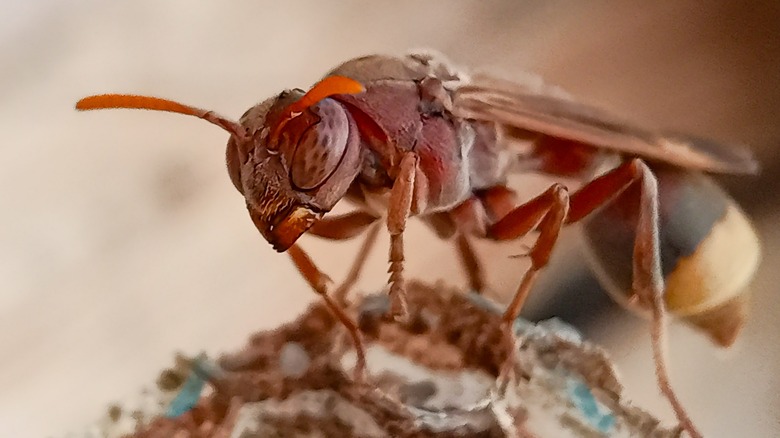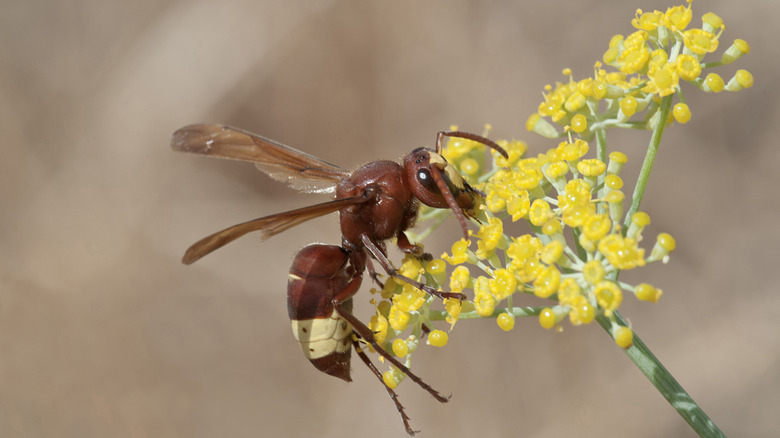The Only Animal That Can't Get Drunk May Surprise You
Humans have an enduring fascination with animals getting drunk in the wild, and for pretty understandable reasons. After all, you've probably seen the viral videos of squirrels feasting on fermented apples until they can no longer walk straight or bears getting lost in the sauce of buried, fermenting grain and passing out cold as a result. It's not exactly an uncommon phenomenon across the animal kingdom, with plenty of species able to get a little tipsy.
Unfortunately, for one animal, getting any kind of a buzz from alcohol simply isn't an option, and that's the Oriental hornet. Researchers at Tel Aviv University recently published a study in PNAS revealing that the hornets' biological adaptations keep them from getting drunk or seemingly experiencing any ill effects, even when they consume massive amounts of alcohol.
The surprising findings further indicate that, unlike humans and other species that suffer significant health consequences from alcohol consumption, these hornets can drink chronically — and drink solutions with incredibly high concentrations of alcohol — yet, they experience virtually no adverse effects on their behavior or lifespan. So how do they do it, and what could that answer mean for other areas of research?
The science behind their superpower
Researchers led by postdoctoral fellow Dr. Sofia Bouchebti conducted a series of experiments to understand the hornets' unique relationship with alcohol. By feeding the hornets solutions with ethanol concentrations up to 80%, the team discovered that the insects metabolize alcohol at a rate approximately 200 times faster than bees.
To put this in perspective, if a 180-pound human were to drink the equivalent amount of alcohol seen consumed by the hornets in the study, they would have to drink five 1-liter bottles of vodka to achieve the task. And yet, even when the hornets consumed alcohol chronically, they displayed no observable impact on their health or behavior.
The hornets' incredible alcohol tolerance stems from a unique genetic adaptation. They possess multiple copies of the alcohol dehydrogenase (ADH) gene, which produces the enzyme responsible for metabolizing alcohol. (If you're especially curious about the details of genetics and the workings of other cellular functions, here's how scientists determine genotypes and understand the role of enzymes in cellular respiration). This genetic modification allows them to rapidly process and eliminate alcohol from their systems, a capability that could potentially offer insights into human alcohol metabolism and its related health conditions.
Alleviating alcoholism in humans
The genetic modification that allows the hornets to process such high concentrations of alcohol is an adaptation that researchers propose could have evolved through the hornets' long-standing relationship with yeasts. Out in nature, yeasts break down the sugars that exist in fruits and nectars, producing alcohol in the process, and the hornets have a very unique way of interacting with yeasts.
"The hornets naturally store yeasts in their digestive system, which provides them with a unique environment that allows the yeast to develop and reproduce, creating new strains. One explanation is that hornets transfer yeasts to fruits, which indirectly contributes to the production of wine," lead researcher Dr. Sofia Bouchebti told Tel Aviv University.
This indirect contribution could be an example of synergy in nature. The biological mechanism that allows the hornets to survive in alcohol-rich environments could also provide valuable models for future research into alcohol metabolism, including potential treatments for alcohol-related disorders. "While alcohol-related research is highly advanced, with 5.3 percent of deaths in the world linked to alcohol consumption, we believe that, following our research, Oriental hornets could potentially be used to develop new models for studying alcoholism and the metabolism of alcohol," study co-author Dr. Eran Levin told Tel Aviv University.


